Previous - San Marino coins before euro
San Marino euro coins - catalog with values
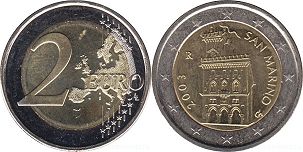
2 euro 2003 (2002-2007)
bi-metallic - nickel-brass/copper-nickel
2 EURO
SAN MARINO 2003
Coin value ~ 15-20 USD
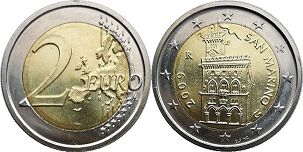
2 euro 2009 (2008-2016)
bi-metallic - nickel-brass/copper-nickel
2 EURO
SAN MARINO 2009
Coin value ~ 20-30 USD
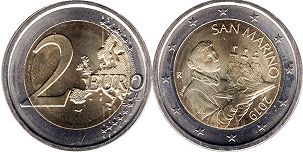
2 euro 2019 (2017- )
bi-metallic - nickel-brass/copper-nickel
2 EURO
SAN MARINO 2019
Coin value ~ 5-6 USD
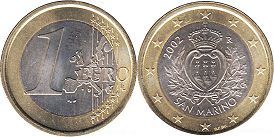
1 euro 2002 (2002-2007)
bi-metallic - copper-nickel/nickel-brass
1 EURO
SAN MARINO 2002
Coin value ~ 10-15 USD
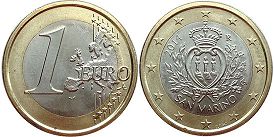
1 euro 2014 (2008-2016)
bi-metallic - copper-nickel/nickel-brass
1 EURO
SAN MARINO 2014
Coin value ~ 4-5 USD
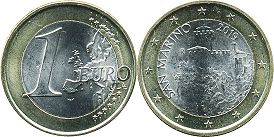
1 euro 2019 (2017- )
bi-metallic - copper-nickel/nickel-brass
1 EURO
SAN MARINO 2019
Coin value ~ 4-5 USD
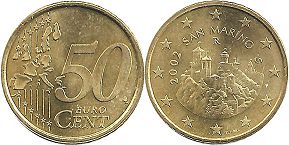
50 euro cent 2002 (2002-2007)
brass
50 EURO CENT
SAN MARINO 2002
Coin value ~ 3-5 USD
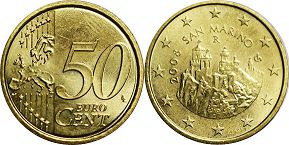
50 euro cent 2008 (2008-2016)
brass
50 EURO CENT
SAN MARINO 2008
Coin value ~ 3-4 USD
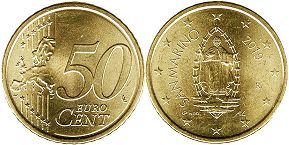
50 euro cent 2019 (2017- )
brass
50 EURO CENT
SAN MARINO 2019
Coin value ~ 2-3 USD
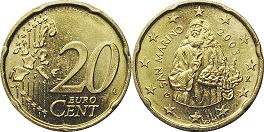
20 euro cent 2003 (2002-2007)
brass
20 EURO CENT
SAN MARINO 2003
Coin value ~ 8-10 USD
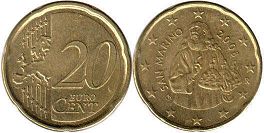
20 euro cent 2008 (2008-2016)
brass
20 EURO CENT
SAN MARINO 2008
Coin value ~ 2-3 USD
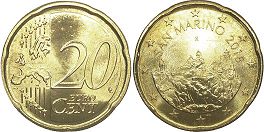
20 euro cent 2018 (2017- )
brass
20 EURO CENT
SAN MARINO 2018
Coin value ~ 1-2 USD
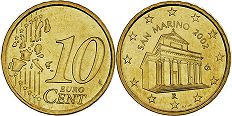
10 euro cent 2002 (2002-2007)
brass
10 EURO CENT
SAN MARINO 2002
Coin value ~ 20-30 USD
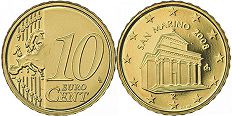
10 euro cent 2008 (2008-2016)
brass
10 EURO CENT
SAN MARINO 2008
Coin value ~ 15-20 USD
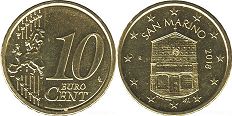
10 euro cent 2018 (2017- )
brass
10 EURO CENT
SAN MARINO 2018
Coin value ~ 20-30 USD
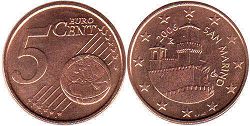
5 euro cent 2006 (2002- )
copper plated steel
5 EURO CENT
SAN MARINO 2006
Coin value ~ US$1
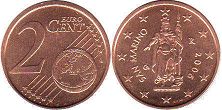
2 euro cent 2006 (2002- )
copper plated steel
2 EURO CENT
SAN MARINO 2006
Coin value ~ US$1

1 euro cent 2006 (2002- )
copper plated steel
1 EURO CENT
SAN MARINO 2006
Coin value ~ US$1
Euro coins of other countries
AndorraAustria
Belgium
Croatia
Cyprus
Estonia
Finland
France
Germany
Greece
Italy
Ireland
Latvia
Lithuania
Luxembourg
Malta
Monaco
Netherlands
Portugal
Slovakia
Slovenia
Spain
Vatican
Costs of San Marino euro coins in this catalog approximate and indicated specifically for the coin shown in the picture.
I do not buy or sell coins - this is just a catalog.

